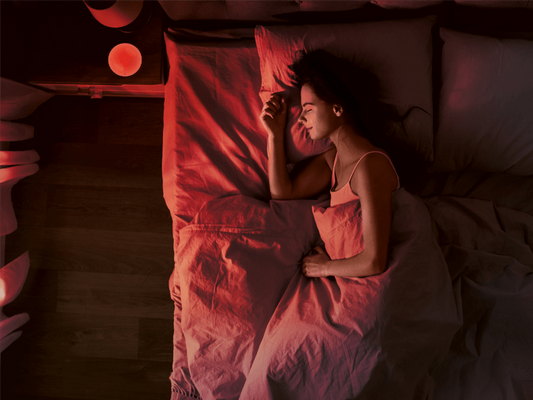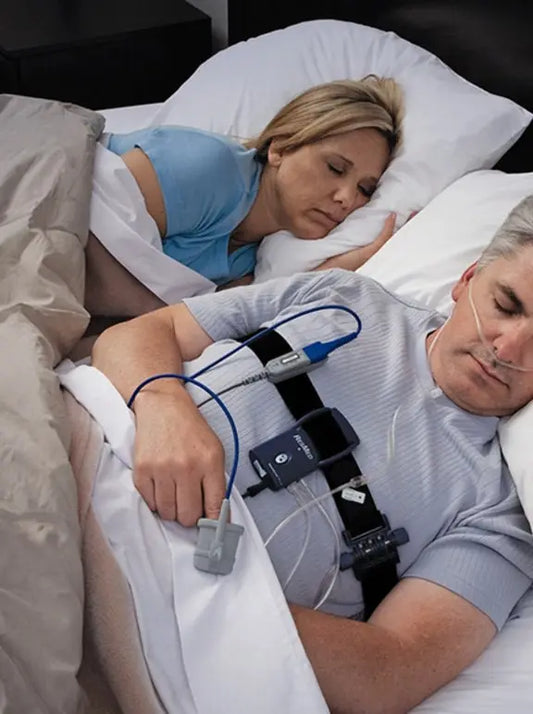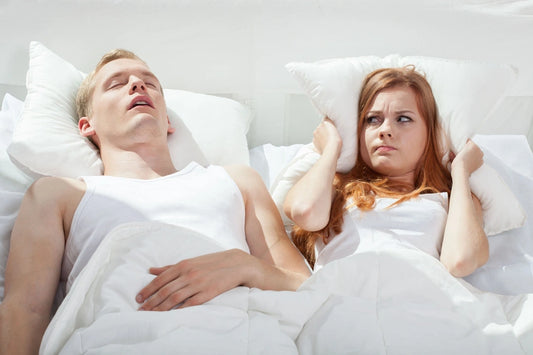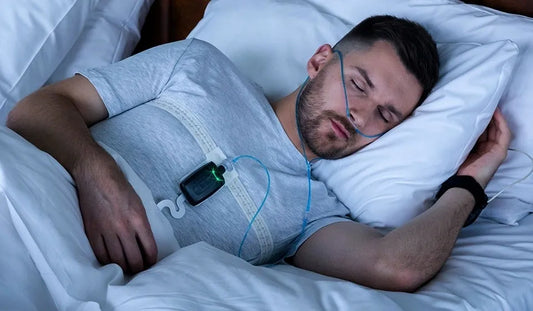Have you had enough of those nights disrupted by incessant snoring, whether yours or your partner's?
It's time to discover effective solutions to this sometimes seemingly intractable nocturnal problem .
The snoring often more than just an annoying noise, can be a sign of more serious respiratory problems, such as sleep apnea.
Fortunately, there are anti-snoring devices designed to help restore peaceful breathing and ensure calm, restful nights.
These solutions range from nasal strips to intranasal orthoses as well as various other means to facilitate airflow and reduce pharyngeal vibrations.
Whether you're an occasional snorer or desperate to put a stop to those nocturnal noises, here you'll find answers and options to help you enjoy a peaceful night's sleep.
What is snoring and why does it occur?
Snoring: a more complex phenomenon than it seems.
Snoring, often perceived as a simple annoying night-time noise, is actually a complex phenomenon resulting from the vibration of soft tissues in the throat and pharynx.
When you sleep, your throat muscles relax, which can lead to narrowing of the airways.
Air passing through these narrowed passages causes the relaxed tissues to vibrate, producing the characteristic sound of snoring.
Several factors can influence this process, such as :
- the sleeping position (sleeping on your back promotes snoring),
- the anatomical structure of the throat and nose,
- the overweight,
- or alcohol consumption.
The causes of snoring can be varied, ranging from simple nasal congestion to more serious conditions such as obstructive sleep apnea.
In the latter case, snoring is accompanied by breathing interruptions during sleep, which can have serious health consequences.
It is therefore crucial to understand the specific reasons for snoring for each individual in order to find the most suitable treatment.

Risk factors and health consequences
Understand the risks to better protect your health.
Snoring is not only a nuisance for the sleeper and those around him/her, it can also be a symptom of underlying health problems.
Risk factors include obesity, which increases pressure on the airways, anatomical abnormalities such as deviated nasal septum, allergies and smoking.
The health consequences are not to be taken lightly.
Chronic snoring can lead to :
- sleep disorders,
- daytime sleepiness,
- and increase the risk of developing cardiovascular disease.
What's more, it's often associated withsleep apnea, a disorder that can have serious impacts on quality of life and overall health.
Identifying and treating the causes of snoring is therefore essential to maintaining good health and ensuring restful sleep.
Types of anti-snoring devices available
Various options for a peaceful night's sleep.
The market offers a wide range of anti-snoring devices, each designed to meet specific needs.
The most popular options include :
- Back2Sleep intranasal orthosis : An innovative device that is placed inside the nostrils to facilitate breathing and reduce snoring.
- Mandibular advancement orthoses : These devices, often custom-made by a dentist, move the lower jaw slightly forward to open the airway and reduce snoring.
- Nasal strips : Simple to use, they are glued to the nose to spread the nostrils and facilitate nasal breathing.
- Nasal dilators : Inserted into the nostrils, they keep the nasal passages open for better air circulation.
- Anti-snoring sprays : Formulated to reduce nasal congestion or lubricate throat tissues, they may offer temporary relief.
- Anti-snoring pillows : Designed to encourage a sleep position that minimizes snoring.
- CPAP (continuous positive airway pressure ) devices: Used mainly to treat obstructive sleep apnea, they ensure a constant flow of air to keep the airways open.
Each device has its own mechanism of action, with some acting mechanically to keep the airways open, while others aim to reduce the obstructions or vibrations responsible for snoring.

Advantages and disadvantages of different options
Make an informed choice.
When choosing an anti-snoring device, it is important to weigh the advantages and disadvantages of each option:
Back2Sleep intranasal orthosis:
- Advantages : Discreet, easy to use and effective in keeping nasal passages open.
- Disadvantages : May require a period of adaptation for some users.
Mandibular advancement orthoses :
- Advantages : Effective for many snorers, adjustable and customizable.
- Disadvantages : They can take some getting used to, and are expensive.
Nasal strips :
- Advantages : Non-invasive, easy-to-use and affordable.
- Disadvantages : Limited effect on severe snoring.
Nasal dilators :
- Advantages : Simple, discreet and reusable.
- Disadvantages: possible discomfort during use.
Anti-snoring sprays :
- Advantages : Easy to use and can provide immediate relief.
- Disadvantages : Effects are often temporary and do not treat the underlying cause of snoring.
Anti-snoring pillows :
- Advantages : Non-invasive and can improve sleep quality.
- Disadvantages : May not be effective for all types of snoring.
CPAP devices :
- Advantages : Very effective for sleep apnea.
- Disadvantages : Requires prescription, can be bulky and noisy.
How do you choose the right anti-snoring device for you?
Find the key to peaceful sleep tailored to your needs.
Choosing the right anti-snoring device depends on a number of factors, including the severity of your snoring, your personal preferences, and the underlying cause of your snoring.
Here are a few steps to help you make the right choice:
- Evaluate the severity of your snoring: Understand whether your snoring is occasional or a chronic problem.
In some cases, such as obstructive sleep apnea, specific devices like CPAPs are required.
- Identify the cause of snoring: Snoring can be due to a variety of causes, such as nasal obstructions, oral problems, or loosening of throat tissues. Understanding the cause will help guide the choice of device.
- Consider your comfort and sleeping habits: Some devices, such as mandibular advancement orthoses or nasal dilators, require adaptation.
Think about what would be most comfortable for you throughout the night.
- Consult a specialist: A doctor or sleep specialist can offer valuable advice and recommend the most appropriate device for your situation.
- Test different devices: Sometimes it may be necessary to try several options before finding the one that works best for you.
Devices such as the Back2Sleep intranasal orthosis can be a good place to start, as they are generally less invasive.
- Consider ease of use and maintenance: Some devices require more care or are more complicated to use.
Choose one that fits easily into your night-time routine.
Finally, bear in mind that snoring can sometimes be a symptom of an underlying health problem.
If your snoring persists despite the use of an anti-snoring device, it's important to consult a doctor for a thorough evaluation.
Natural anti-snoring alternatives
Gentle solutions for a peaceful night's sleep.
When it comes to reducing snoring, turning to natural remedies can be an excellent option.
These gentle, non-invasive methods are often easy to incorporate into your night-time routine:
- Throat exercises : Strengthening throat muscles can help reduce snoring. Simple exercises such as singing or pronouncing vowels can be effective.
- Essential oils : Certain oils, such as eucalyptus or peppermint, can help clear the airways and ease breathing.
- Sleeping position : Sleeping on your side rather than on your back can prevent snoring by preventing the tongue and soft tissues of the throat from blocking the airway.
- Hydration : Drinking enough water helps keep mucous membranes hydrated and can reduce snoring.
- Air purifiers and humidifiers : Clean, humidified air can make breathing easier and reduce snoring.
These natural methods can be particularly useful for those who prefer to avoid medical devices or are looking for complementary solutions to other treatments.
Lifestyle changes to reduce snoring
A healthy lifestyle for peaceful nights.
Modifying certain aspects of your lifestyle can have a significant impact on reducing snoring.
Here are a few changes that may help:
- Weight loss : Being overweight can increase pressure on the airways, so losing weight can reduce or even eliminate snoring.
- Avoid alcohol before bedtime: Alcohol relaxes throat muscles, which can make snoring worse.
- Quitting smoking: Smoking irritates the airways and can exacerbate snoring.
- Regular exercise : Regular physical activity can improve muscle tone, including that of the throat muscles, and help reduce snoring.
- Establish a regular sleep routine: Regular, quality sleep can reduce snoring.
Frequently asked questions about anti-snoring devices
Q. Can snoring be completely eliminated with these devices?
- Anti-snoring devices can be very effective, but their ability to totally eliminate snoring varies depending on the individual and the underlying cause of the snoring.
For example, if snoring is due to nasal obstruction, devices such as nasal dilators or strips can offer significant relief.
On the other hand, for more complex cases such as sleep apnea, more sophisticated devices such as CPAPs are required. It's important to consult a doctor to determine the cause of snoring and choose the most suitable device.
Q. Any side effects when using these devices ?
- Some anti-snoring devices may have minor side effects. For example, mandibular advancement orthoses can cause dental or jaw discomfort, while nasal dilators can cause nasal irritation.
However, these effects are generally temporary and fade as the user becomes accustomed to the device. It is advisable to start with gradual use, and to consult a healthcare professional if discomfort persists.
Q. How do you know if an anti-snoring device is effective?
- To assess the effectiveness of an anti-snoring device, observe changes in the frequency and intensity of your snoring.
An effective device should significantly reduce snoring and improve the quality of sleep for you and your partner.
What's more, you should feel more rested and alert during the day. If you have any doubts about the effectiveness of a device, don't hesitate to consult a sleep specialist, who will be able to carry out a more in-depth assessment, sometimes using a sleep study.
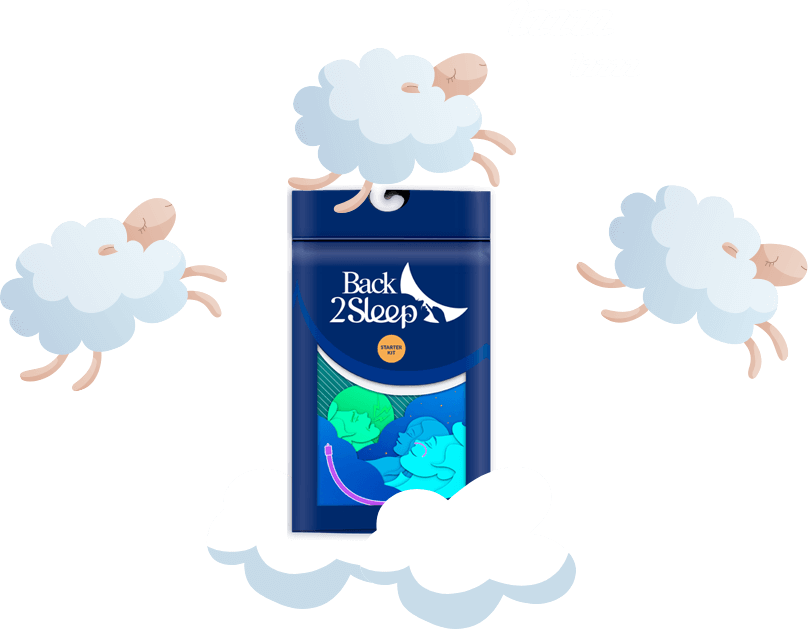
- Choosing a selection results in a full page refresh.
- Opens in a new window.


